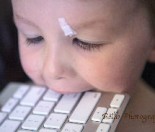Here’s a reality check and it’s courtesy of my good friend Jim Mora (he was the warm, witty voice of Wonder Dogs)- Jim’s afternoon radio show on National Radio always comes with fascinating information to ponder.
An example was heard last week; Beloit College in Wisconsin in the United States gives its Professors a hand on how to relate to each new year’s crop of students.
They work out the year the incoming students were born and what was in existence at that time. This allows the lecturers to relate better to the students.
In other words talking about “dialing numbers” or “using a typewriter” is a foreign language to today’s university students.
Those starting University this year were born in the late ’80s or very early ’90s and are too young to remember the space shuttle disaster, have never known a world without Aids, or CDs which came into being about the same time as they did.
They’ve always had voicemail or answer phones. They cannot relate to a time when you didn’t have a remote control. They don’t know who Mork and Mindy were. Mention the Fonz and Happy Days and you’ll draw a complete blank.
They’ve never heard of Clayton’s “the drink you have when you’re not having a drink” and don’t care who shot JR. David Lange is their equivalent of Walter Nash or even Rob Muldoon for our generation.
They’ve grown up with a mouse in one hand and a computer screen as part of their worldview. They learned to surf the internet as they learned to read.
The Soviet Union has never existed and therefore is about as scary as the student union. Smoking has never been permitted on airlines, they grew up with and have outgrown faxing as a means of communication. “Google” has always been a verb. Text messaging is their email and they’ve rarely used a postage stamp.
Interesting isn’t it how we tend to not notice that the world is constantly changing and you just expect that everyone else can relate to what you relate to. Perhaps that’s why we all get on well with our own generation.
But the big issue is that because of this knowledge we, as parents, have to change our attitudes and I guess like the generations of parents who’ve gone before us, we have to realize that our children live in a different age and perhaps we have to adapt.
There was a generation of parents who thought a pelvic thrusting Elvis Presley was simply appalling and the devil’s work. We have to remind ourselves of that when we hear Eminem or Kanye West and just can’t understand what our kids enjoy about it.
Mark Prensky is a writer, speaker, and consultant in modern education and learning. He reckons games are a great way of teaching. He’s created over 50 software games for learning.
I find this particularly interesting as we have prided ourselves on being a no Play Station / Xbox family. We don’t mind our kids playing on them at their friends, but we just didn’t want the distraction and arguments that these machines seem to cause.
Of course when our son was aged 7 – 10 we were the meanest parents in the world, but after muttering under his breath for a while he’d pick up a ball and amuse himself in other ways.
He then began to acknowledge that probably it was the best thing and having the odd computer Soccer or Rugby game was just fine.
Maybe we were a bit out of date with our Play Station rule because Mark Prensky says today’s students represent the first generation to grow up with a wealth of new technology, and that it’s just the reality of life today.
Many kids have spent their entire lives surrounded by and using computers, videogames, digital music players, video cams, cell phones, and all the other toys and tools of the digital age.
Today’s average university graduates have spent less than 5,000 hours of their lives reading, but over 10,000 hours playing video games and, wait for it, 20,000 hours watching TV. Computer games, email, You Tube, the Internet, cell phones and instant messaging are integral parts of their lives.
With all the information they are gathering it’s clear students today think and process information fundamentally differently from us.
Mark Prensky calls today’s kids Digital Natives because they were born into the world of computers, video games and the internet. Another name is Net Gen for the internet generation.
So what are we parents? Well, because we’re having to learn this new technology, we’re called Digital Immigrants.
Like all immigrants, we have to adapt to our new environment. We still have to remind ourselves to look on the internet for information. For example we look up a phone book or the Yellow Pages for a number, rather than going straight to the White or Yellow Pages on-line.
You’re a Digital Immigrant if you print out your emails, or need to print out a document written on the computer in order to edit it rather than just edit it on the screen. The worst example of a Digital Immigrant is if you have to phone someone up and ask them “did you get my email.”
Digital Natives, i.e. our kids, are used to receiving information really fast. They like to multi-task and prefer pictures and graphics before the written stuff, whereas our generation likes to read first and look at the pictures last.
When I was a kid I used to have the radio on when I did my homework. My parents were always on at me to turn it off, but in my own simple way I was multi-tasking then. Listening and learning. Perhaps that’s why I’ve ended up with a career in radio.
I’m sure most of today’s parents can’t see how you can learn successfully while watching TV or listening to music, because they weren’t allowed to as kids or would find it hard to concentrate now.
But that may be because we didn’t learn by watching The Wiggles or Little Einsteins, like today’s kids.
No doubt many parents assume that ways to learn are the same as they have always been, and that the methods that worked for them when they were students will work for their kids now. But perhaps that is no longer true.
Today’s learners are different and today’s teachers have to learn to communicate in the language and style of their students.
The traditional education of reading, writing, arithmetic and understanding the writings and ideas of the past seems to be now firmly from another era.
In my time there was always a great debate about whether you should use a calculator in an exam. But now I think we have to acknowledge that calculators and computers are a part of the our world and always will be, so they should factor in all aspects of education including exams. Perhaps part of the test should be proving you know how to use them.
I wonder that if a generation can memorize over 100 Pokémon characters with all their characteristics, history and evolution, then why can’t they learn the names, populations, capitals and relationships of all the 101 nations in the world?
I guess it just depends on how it is taught and with today’s kids, if you make it like a game, then perhaps the information uptake might be better.






